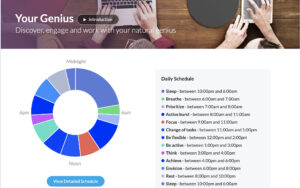
11 Okt Chronobiology: the gamechanger you may have missed
Ein Beitrag von Mirjam Grayson, hr matters GmbH, www.hrmatters.ch
How to amplify engagement, resilience and performance in your team
Does the early bird really catch the worm?
Sally is up at the crack of dawn, feeling energetic and ploughing through her tasks at full speed, before others arrive at the office. She’s wondering why it takes some of her colleagues so much time to get into gear. She may even think they’re lazy.
Sharon, on the contrary, struggles getting out of bed and makes it to her workplace just in time. She is super productive in the later morning and well into the evening. But she wonders how others can be so “full on” early on. It may even make her feel guilty.
We all know a Sally or a Sharon, and it’s very likely we have witnessed a clash between an Early Bird and a Night Owl, maybe within our family or at work. It goes without saying that in our society, early birds are often favoured, as they seem to achieve more. But if the Early Bird catches the worm, maybe the Night Owl not only gets the mouse, but enjoys a burst of energy in the later part of the day?
In this article, we shine a light on the following:
- What is chronobiology
- Characteristics of Early Birds, Night Owls and those in between
- The cost of ignoring your body clock
- Amplifying engagement, resilience and performance through Chronobiology
- Practical tips for the workplace
In order to answer these questions, we need to refer to science of chronobiology.
What is chronobiology?
Chronobiology is the study of biological rhythms and timekeepers. Body processes depend on the time of day and night. That’s why, for example, it’s not a good idea to eat at night. On top of this day/night rhythm, each organ has its own biological clock system. The exposure to light, eating and moving habits as well as other environmental factors have the ability to either maintain or disrupt the biological rhythms. Therefore, it is quite important what an individual does at a certain time of the day. Think about the impact of jet lag and shift work, or that cup of coffee late in the afternoon. It’s also important to understand that we’re all different. The basic circadian rhythm is genetically determined. We’ll come back to that.
Characteristics of Early birds, Night owls and those in between
Early birds find it easy to jump out of bed even before the sun rises, thrive when they move early on in the day and are great at focusing and problem solving in the morning. They do well with a change of tasks around midday and often find some more inspiration towards the later part of the afternoon. Generally speaking, high intensity in the morning helps them feel great throughout the day.
Night owls on the contrary do a lot better when they are given the opportunity to ease into the day. They are creative and productive in the later morning and will be able to perform even better later in the day. Working out in the later afternoon feels great for them too. They have the ability to be productive way longer into the evening than the early risers. Generally speaking, high intensity for them in the morning is stressful for their body, but can be tolerated much better in the later part of the day.
It is too simplistic to categorize everyone into just those two groups, this is just a rough guideline. As mentioned earlier, we’re all unique, and therefore we need to be aware of the circadian rhythm of all those “in between” as well: the times when their brain is at their maximal productivity, when they need to wake up to feel at their best, their optimal morning routine, time to nourish themselves, exercise, for socializing or problem solving will be different from other Early Birds or Night owls. It is in their biology. It’s neither good or bad, right or wrong, it just is!
The cost of ignoring your body clock
Living in tune with our biological or circadian rhythm will not only support a restful sleep, it will also help to get the very best out of our day. Knowing our most productive or most creative phase, when to give our brain a rest, to move and fuel up will make a huge difference not just for our productivity, fulfillment and resilience, but for our general health and wellbeing.
This doesn’t mean that we can’t get used to doing what’s not in our nature, but it may come with a high cost. Ifthe body is out of sync, it will very likely mean lower energy levels, it may also lead to digestive disfunction, some extra weight, increased stress levels, even mental health issues and chronic “dis-ease”. Things we can get used to, but do we choose to?
Amplifying engagement, resilience and performance through Chronobiology
Imagine this: You get up at the time that’s perfect for your body. Your morning routine sets you up for the day, you nourish yourself with the foods that give your body (and mind) most benefits, you get to work at the time that suits you best, focus when your brain is at its maximal productivity, interact with others when you need a change of scene, have a brainstorm session when you’re most creative and have a few minutes to yourself (e.g. to pause or meditate) when your brain needs it most.
We all have days when we’re in flow, highly productive and achieving our goals seems effortless. Likewise we have days when we’re lacking focus, motivation and direction. This could indeed depend on what we’re doing at a given time of the day. So how can we up our game?
Practical tips for at work
- Find your optimal (regular) sleep/wake rhythm
- Don’t eat at night
- Soak up the sun (early in the day)
- Accept that at certain times of the day you are naturally more (or less) productive
- Structure your day according to your own biological clock
- plan tasks that require high concentration at times when you naturally concentrate and focus best
- Plan social interaction when you feel you need it – they can be a real energy booster
- Stay away from coffee after midday
- Observe how you feel after meals and whether smaller serves more often or fewer bigger meals make you feel better
- Avoid artificial light before bedtime
- When you lose focus and concentration, observe how a change in task can get you back on track
- Create awareness around each individual’s chronobiology in your team
Adjusting work to each individual’s “body clock” will not always be feasible. But paying attention whenever possible has been a huge gamechanger for many.
Summary
While understanding your Chronobiology will give you the tool to make the best out of your day, increase your productivity and health long term, creating awareness around the topic within the framework of your team will be a total gamechanger. If the business allows, why not let the early birds play to their strengths and start the day before those who, by nature, need a bit more time to get going? Or hold a brain-storm meeting at the time when most of the team are in their creative phase? You’ll be surprised of the outcome.

Image: Lifestyle Chronobiology of an individual (SHAE app)
It’s in your genes
As mentioned earlier, our chronobiology is genetically determined. The good news is, thanks to science and thousands of algorithms, we now can find out easily when is the perfect time to do what for each individual. That’s personality profiling at its best, with the bonus of built-in personalized wellness.
Keen to increase your productivity by harnessing your circadian rhythm to your advantage? Wanting to up your game for yourself and your team? Get in touch and we’ll get back to you with more information and a link to a free quick assessment for yourself.
Mirjam Grayson is a HR Professional, ph360 Health Coach and SHAE Wellness Provider, Bodylight Pilates Instructor and Yoga teacher. She combines her passion for people, health and wellbeing and supports individuals and corporates by bringing more awareness for health into their lives and the workplace.
Bildquelle: krakenimages on Unsplash

